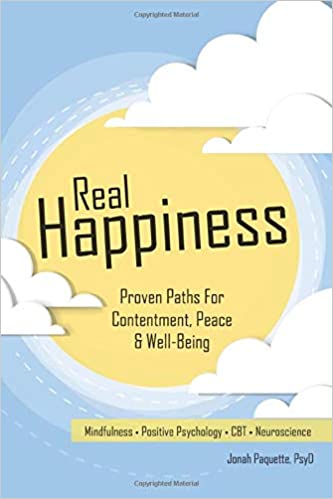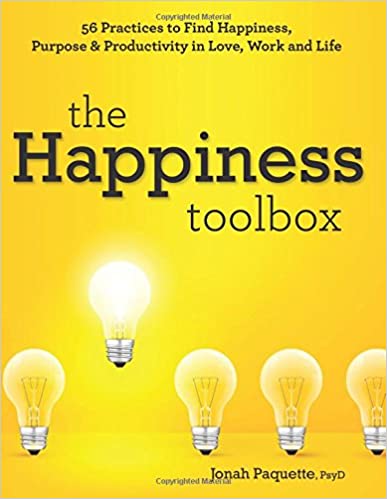Hi Guys,
I am always preaching about how important self-care is. I hope you’re not sick of it. It is SO important. Especially now. There is a lot of chaos happening in our country. We are in the thick of the biggest civil rights movement of our lifetime while continuing to face a pandemic. It is crucial we pay attention to ourselves, so we can stay mentally and physically healthy and grounded. It is more important than ever that we are in tune with what we need to approach life standing on level ground both physically and mentally. During these stressful and overwhelming days it can be really hard to stay positive. Every morning, I tell myself, “Today is going to be a great day.” (As taught to me by Dr. BJ Fogg. You should check out the podcast we did together if you have the chance.) Some days I believe it and some days I don’t. Saying this at least begins to reframe my thinking. It’s the smallest acts that can really help me keep my head above water.
Jonah Paquette, PsyD, is here to share the importance of caring for ourselves. Dr. Paquette is a licensed clinical psychologist, speaker, and author. As a psychologist for Kaiser Permanente in the San Francisco Bay Area, he conducts group and individual psychotherapy, performs crisis evaluations, and oversees the mental health training programs across four medical centers. In addition to his clinical work and writing, Jonah offers training and consultation to therapists and organizations on the promotion of happiness and conducts professional workshops both nationally and internationally.
I hope you find his words helpful.
xo,
Whit
Caring For Yourself During COVID-19 by Jonah Paquette, PsyD
As the world continues to grapple with COVID-19, we find ourselves consumed by fear. We fear for our future, for our parents, for our children, and for the toll that this virus may take across our entire planet. Many of us find ourselves struggling psychologically, unable to cope with what’s happening. We might struggle to sleep, feel more depressed, not eat (or eat too much), want to drink more than usual, or feel constantly stressed and overwhelmed. So if you find yourself feeling any of those things, the first (and most important) thing to remember is: you’re not alone, and these feelings are totally normal.
The famous psychiatrist Viktor Frankl once observed that “an abnormal reaction to an abnormal situation is normal behavior.” In this unprecedented time we find ourselves in today, we’d be wise to remember his message. Because when we’re facing the type of uncertainty and widespread disruptions that we all are right now, it’s normal to feel stressed, anxious, scared, and overwhelmed. But in addition to giving ourselves space to feel whatever we’re feeling, it’s also important to foster healthy psychological habits that help build resilience and enable us to rise to this occasion.
Thanks to modern research spanning psychology and neuroscience, we now have a good understanding of the key ingredients for resilience and psychological well-being. During times like these, it’s especially important that we prioritize self-care and give ourselves the nurturance that we need in order to cope with all that’s happening in the world around us. These ten simple principles have all been shown to improve our mental and physical health, and even change our brain in a lasting way. In the days ahead, try keeping them in mind and incorporating them in your life however you’re able to:
- Fostering connection: Studies have shown that the quality of our closest social relationships has a huge effect on our health and happiness. But many of the current social distancing measures during COVID-19 can lead to loneliness and isolation. So it’s especially important to get creative and help turn “social distancing” into “physical distancing.” Find small ways to feel connected to those you love. Schedule Zoom or FaceTime “happy hour” with friends, and reach out to loved ones for support when you need. Even these seemingly small moments of connection can do wonders for our mental health.
- Appreciating what’s good: The practice of gratitude has been linked to lower depression, improved physical health, closer relationships, and much more. Even though it’s easy right now to focus on all that’s going wrong in the world, it’s especially important to see the whole picture, including the good stuff. Whether it’s by creating a gratitude journal, writing down something we’re thankful for each day, or reaching out and expressing thanks to someone who’s helped us in our life – there’s no wrong way to do it.
- Staying present: Even in the best of times, our minds often wander and drift off. But in a time like this, many of us find that our mind is constantly anxious about the future, and find it hard to stay in the here-and-now. The practice of mindfulness can improve our mental and physical health, improve our immune system, and help give us a sense of peace in the present moment. Whether through formal meditation or simply choosing small ways to be present throughout the day (like savoring a meal, taking a slow walk, or luxuriating in a bubble bath), try finding small ways to slow down and to simply be.
- Being there for others: Stepping out of ourselves by being kind towards others is another great way to shift our mindset and foster well-being. Check in with the people you love, donate to a cause you believe in, and find small acts of kindness you can engage in to make the world around you a better place.
- Being kind to ourselves: Many of us are our own worst enemy, and find it harder to be kind towards ourselves than we are towards others. Try noticing how you talk to yourself, especially when you’re stressed, and soften the language a bit. How would you speak to a loved one? How can you take care of yourself when you’re hurting?
- Savoring small joys: As clichéd as it might sound, one of the most important skills we can develop is to learn to stop and smell the roses. When you’re experiencing a small pleasure, pause a bit and let it linger. If there’s something you’re looking forward to, visualize it and make it feel real. This practice, dubbed “savoring” by psychologists, has been linked to improved psychological well-being and even lasting brain changes. Even the seemingly small stuff – our morning coffee, a nice bath, quality time with loved ones – can be an opportunity to savor.
- Remembering to breathe: When we’re anxious and stressed, our breathing often becomes restricted and uneven. Our sympathetic nervous system (think: fight or flight) becomes activated, making it hard to relax and calm ourselves back down. One of the simplest yet most effective ways to promote our relaxation response is through our breath. Specifically, training ourselves to both slow down our breath, and most important extend our exhale (so that our exhale is just a bit longer than our inhale) can help reduce anxiety and foster feelings of relaxation and peace.
- Focusing on what’s in our power: Situations like this with COVID-19 are a reminder of how much of what happens in life is outside of our control. And yet finding small ways to take proactive steps can help give us a sense of mastery and can enable us to make the most of a challenging situation. Reflect on how you can shift from anxious rumination to productive problem-solving – are there small steps that I can take to make a difference in my own life or the lives of the people I love?
- Keeping healthy limits: These days, it’s easy to feel bombarded by non-stop tragic stories on both the news and social media. Not only is most of the news out there negative (as they say in the news industry, “if it bleeds, it leads.”), but the sheer amount of stories out there can make it hard to know what to even believe. Try finding ways to limit your consumption of news or social media related to COVID-19. Set aside a bit of time each day to feel informed, but not so much that you feel overwhelmed and defeated. And of course, make sure to check your sources.
- Finding meaning: Challenging times like this can also offer us an opportunity for growth an meaning, and to tap into our own strengths and resiliency. Like a phoenix rising from the ashes, we can turn this difficult chapter into something more profound. Take some time in the coming and notice your own growth, and your own strength. See if any of your perspectives change, or if your values become clearer. And notice whether there are any opportunities to connect yourself to something bigger.
Most of all, try being gentle with yourself as you go through this challenging time. No matter how things feels right now, the darkest hour is just before the dawn.
——–
If you found his words helpful, check out his books below!









Self-care is so important, so I hope you keep talking about it 🙂 Today I am lying in bed, watching some old episodes of The Hills. (I’m really shocked at how uptight the Teen Vogue staffers were!) My husband offered to take our girls outside to swim for a few hours, and I let him. I would’ve felt really guilty about that 5 years ago, but today I know that I’m a great mom and I deserve some time off, too. Love your website; keep up the great work!